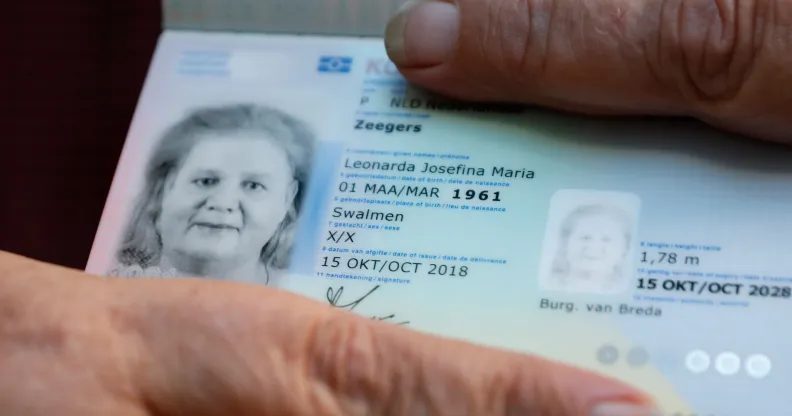Dutch government makes legal transition for transgender people easier

Leonne Zeegers was the first Dutch person to receive a neutral passport (Bas Czerwinski/AFP/Getty Images)
Transgender children in the Netherlands are now able to change their gender on passports before the age of 16, while trans adults can self-identify without a doctor’s statement.
Children seeking to have their gender legally recognised will be able to do so by requesting a court date.
Sander Dekker, the Dutch minister for legal protection, said on Thursday (April 11) that judges will grant such requests only in “extreme circumstances.”
Responding to criticism that children may “change their minds” and revert back to the gender they were assigned at birth, he confirmed that any child who legally transitions will be given only one opportunity to reverse course without a court date.
Netherlands streamlines legal gender change
The path to legal recognition has also been made easier for people aged 16 and above, who can now change their gender marker without a statement from a doctor or psychologist.
Under the new process individuals will be given four weeks to cancel a change in legal gender before it becomes permanent.
LGBT+ groups said that they were “pleased with the abolition of the expert statement,” but argued that the new measures are not far-reaching enough.
Transgender Network Netherlands, COC and NNID released a joint statement which read: “This proposal does not provide any relief to intersex people and violates the right to self-determination of transgender children.”
“This proposal violates the right to self-determination of transgender children.”
—Transgender Network Netherlands, COC and NNID
Intersex and non-binary people in the Netherlands can apply for the gender marker X, but must do so through the courts without any guarantees. Dekker indicated that this process may also be made simpler.
Which countries issue gender-neutral passports?
Leonne Zeegers became the first Dutch person to receive a gender-neutral passport in October 2018, following a two-year legal battle.
Australia, Denmark, Germany, New Zealand and Pakistan, India, Ireland, Canada and Nepal have also introduced (or are introducing) a gender-neutral passport, alongside a handful of US states.
In June 2018 Christie Elan-Cane lost a high court challenge which called on the British government to adopt an X marker.

